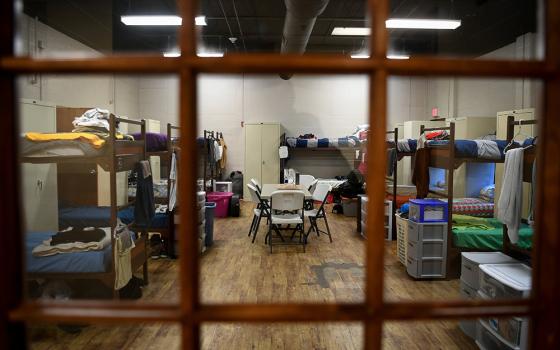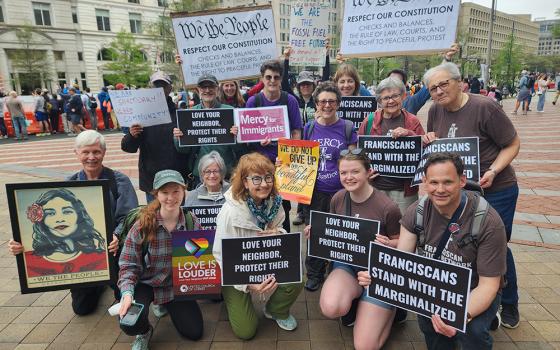One of the arguments made against the mosque near Ground Zero – not at Ground Zero, by the way, it is two New York City blocks away from the perimeter of Ground Zero – is that while these Muslims have every right to build a mosque there, it is imprudent to do so. Conservative talking head Dan Senor and Wall Street Journal columnist William McGurn have drawn an analogy between the Ground Zero mosque and the Carmelite convent at Auschwitz that Pope John Paul II ordered moved. The analogy is a false one, but it is illuminating in spite of itself.
I do not wish to engage in the comparison of suffering which seems to be insulting to victims on all sides. The victims of Auschwitz and the victims of September 11, 2001 both cry out to the heavens for justice. The crimes were different, of course. What happened at Auschwitz was genocide and what happened at Ground Zero was terrorism. There is a sense in which Auschwitz is uniquely horrible to Jews; at Ground Zero, Christians, Jews, Muslims and non-believers alike were slaughtered. Although I am an American, I did not survive 9/11 the way a Jew survived the Holocaust.
The point that McGurn was making, the wish really, had nothing to do with the relative nature of the crimes, nor with the relative virtues of the Carmelite nuns and the Muslims who wish to build a mosque in lower Manhattan. His wish, and Senor’s, was that there would be forthcoming the Muslim equivalent of Pope John Paul II who told the nuns that despite their best intentions, they should not have a convent at Auschwitz. That would certainly make life easier for everyone, but that is not the situation and so this fanciful wish, instead, gives new life to those whose concerns about the mosque are more sinister. Ah, they say, why can’t those people just do what the nuns did.
The reason the analogy fails is that Poland is not America. Poland with its centuries of anti-Semitism and its lack of history with constitutional government could not, in the twinkling of an eye, repent and then send even its least offensive citizens, its religious sisters, to Auschwitz without a whiff of scandal. Poles do not get to determine how Jews should mourn. Pope John Paul II, not because he was a religious leader but because he was a Pole, grasped this instinctively. John Paul II acted with his authority as Pope but also with his insight as an enlightened Pole. If the Pope in the 1990s had been an Italian, he never, ever would have ordered the nuns from the gates of Auschwitz.
In all the talk about the “Muslims” who want to build the mosque near Ground Zero, it is too easily forgotten that they are Americans too. It is also too often forgotten that among the victims and the survivors of 9/11 are many Muslim families. Why should the Christian families who lost loved on that awful day be able to repair to St. Peter’s Catholic Church near Ground Zero, but the Muslim families have no similar place? One of the problems with this whole “they have the right but it is not wise” line of argumentation is that sounds a lot like, “Now, Miss Parks, you have the right to move to the front of the bus, but is it wise?” The point is not one of political strategy. The point is that Miss Parks got to decide, not somebody else, when she wanted to move to the front of the bus. There are millions of American Muslims or Muslim-Americans. They get to decide when and how to address the challenges that face every “hyphenated” group, just as the African-Americans and the Italian-Americans do. When the “mob” chooses, we get Jim Crow and the 1920s immigration restrictions.
More importantly, America has the longest and proudest tradition of religious liberty in the world. For us to look for arguments against the mosque, even those arguments which do not entail a denial of the constitutional right of Muslims to build the mosque, is to give aid and comfort to those who are willing to run roughshod over America’s tradition of religious liberty in the interests of preserving some variety of narrow, usually “Judeo-Christian” view of American history. (Having never met a “Judeo-Christian,” I am always suspicious when that category of beliefs is invoked.) What makes us “Americans” is not our commitment to Jewish or Christian or Buddhist values but our shared commitment to the principles enunciated in our Constitution, a document which, despite the many attempts to make the Founding look like an expressly religious start-up, owes as much to its secular antecedents as to the undeniably Protestant air that most of the Founder breathed.
There is a final aspect of the analogy that I think bears examination. The Holocaust occurred during World War II when the threat to human freedom and flourishing was enormous. Nazi Germany had overrun virtually all of Europe. Al-Qaeda and other Islamic extremists are just as evil as Hitler, I have no doubt, but they cannot overrun Europe. They lack the power to do so. They can, demonstrably, inflict great suffering with their terror, but they cannot “defeat” us in any military sense of the word. The only way the terrorists can win is if, by means of effective terror, they scare us into abandoning the standards of civilization we have achieved. One of the most precious of those standards is the principle of religious liberty. This, ultimately, is what is so wrong about Senor’s and McGurn’s invoking a rationale, any rationale, to oppose the ground zero mosque because it is Muslim: Instead of defiantly refusing to abandon our humane way of social life, they want us to compromise, to find an excuse to scuttle the mosque, to appease the bigots and hand a victory to the terrorists. Those terrorists do not hate us because we happen to be alive. They hate us because of our way of life. The best reason to build a mosque near Ground Zero is precisely because it shows the whole world that we shall not be intimidated by terrorists, that our humane civilization has survived 9/11 in tact. The obvious analogy from the murderous soil of Auschwitz was never a Catholic convent, it is Israel.
N.B. In a moment of supreme serendipity, while finishing this post, I hit one of “My Favorites,” and discovered that my dear friend Rick Hertzberg had posted on this analogy between the convent and the mosque at The New Yorker. Our treatment is different in significant ways, with some overlap, and no disagreement. His final paragraph, written with all the grace and clarity we have come to expect from Hertzberg, is one of the finest statements of humane liberalism you will encounter.



